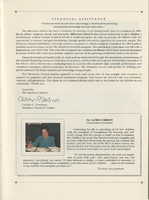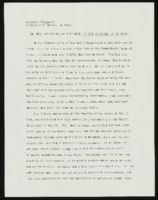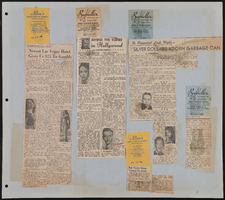Search the Special Collections and Archives Portal
Search Results

Program from event at Treasure Island at the Mirage, Tenth Anniversary Scholarship Benefit for the Meadows School, May 20, 1994
Date
Archival Collection
Description
The "Presidential Evening" event at Treasure Island was held to raise funds for the Nat Hart Scholarship Endowment Fund and General Scholarship Fund for the Meadows School in Las Vegas.
Text
J. T. McWilliams Family Papers
Identifier
Abstract
The collection consists of letters, greeting cards, survey maps, newspaper clippings, legal papers, photographs, collected recipes, land sales and expense journals, and survey reference books. The material was created or collected by pioneering Nevada surveyor, engineer, and real estate entrepreneur J. T. (John Thomas) McWilliams and his wife, Iona, between 1900 and 1968.
Archival Collection
Maria LaCavera Papers
Identifier
Abstract
The Maria LaCavera Papers (1947-2017) contain the papers of professional dancer Maria LaCavera. The collection documents the career of LaCavera dancing in Las Vegas, Nevada at the Flamingo Hotel in 1947, and the Last Frontier Hotel in 1949 as one of the Ramona Girls dancing in the Danny O'Neil Varieties Act. Materials include photographs of LaCavera and other Ramona Girls, newspaper clippings, correspondence, LaCavera's American Guild of Variety Artists (AGVA) employment contracts, Fabulous Las Vegas magazines, and hotel receipts. Other items of note include photographs of the 1949 Helldorado parade, a Frontier Hotel Ramona Room menu, and Frontier Hotel ephemera. There is also a copy of a self-published biography of LaCavera, written by her daughter-in-law Kristin Meyer entitled From Bon-Air to the Last Frontier. The collection also contains the digital images used to illustrate the book.
Archival Collection

Transcript of interview with Henry Kronberg by Barbara Tabach, February 26, 2015 and April 13, 2015
Date
Archival Collection
Description
Interview with Henry Kronberg by Barbara Tabach in two sessions, February 26 and April 13, 2015. In the first session Kronberg talks about his childhood in Germany and Poland and his experience being imprisoned by the Gestapo, and transported to a concentration camp. He survived the Holocaust and met his wife, and they moved to the United States in 1946. He discusses being reunited with his sister in Las Vegas after decades of searching, and moved his family to Las Vegas in 1962. Kronberg talks about becoming involved with Jewish life here, and his wife, Lillian's involvement at Temple Beth Sholom. In the second session, Kronberg discusses purchasing Stoney's, a loan and pawn shop, including some of the clientele and merchandise. He also discusses other social and environmental concerns like anti-Semitism and water resources in Southern Nevada.
Henry Kronberg was born in 1920 and spent his early childhood in a town on the border of Poland and Germany, about 40 miles from Krakow. For years he felt uncomfortable telling his story of surviving the Nazi concentration camps of World War II. Today his name is linked to the Sperling Kronberg Mack Holocaust Resource Center in Las Vegas. And in his soft-spoken manner, Henry recalls his ordeal of loss of family and survival during this most heinous of situations through backbreaking labor and ingenuity. At the end of the war, Henry met the love of his life, Lillian, also a survivor. The two married in 1946 in Frankfurt and immigrated to New Jersey where she had relatives. He describes their difficulties and the various jobs he held until becoming an excellent baker. Then in 1962 an interesting choice took him to a bar mitzvah in Canada. While there the dinner conversation lead him to a great discovery?his sister Lala had survived and was living in Las Vegas. Soon he moved his wife and daughter to Las Vegas. His first foray into business was with his brother-in-law. However, soon it was important to be independent and to control his own destiny. He purchased a going concern, Stoney's Pawn Shop, from Dr. Alexander Coblentz, one of the city's first doctors. He became the fourth owner of Stoney's and operated it until selling it to Steven Mack in 1998. Henry and his wife were active in the Jewish community. They joined Temple Beth Sholom and became fast friends with many of the early leaders of Las Vegas and became a respected member of the secular and Jewish communities.
Text

"An Impact of the Moulin Rouge Hotel on Race Relations in Las Vegas": manuscript draft by Roosevelt Fitzgerald
Date
Archival Collection
Description
From the Roosevelt Fitzgerald Professional Papers (MS-01082) -- Unpublished manuscripts file.
Text

Mabel Hoggard: lesson plans and textbooks
Date
Archival Collection
Description
Folder of materials from the Mabel Hoggard Papers (MS-00565) -- Educational work and legacy file. The folder contains a "Teachers' manual for human geography," teaching notes, notes on United States history, assignments, and an exam book with handwritten notes. Many of the documents are handwritten.
Mixed Content

Thelma Jenkins interview, October 15, 1985: transcript
Date
Archival Collection
Description
On October 15, 1985, collector Lynn Ballard interviewed Thelma Jenkins (born June 10th, 1923 in Paragonah, Utah) at her home in Henderson, Nevada. In this interview, Thelma Jenkins discusses her career in nursing as well as the differences in the various positions she’s worked. She also talks about attending various conventions and her membership in the Nevada Nurses Association.
Text



